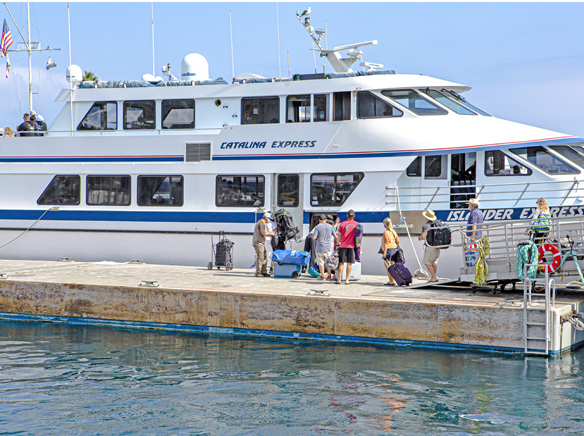Catalina Express CEO says it would cost $120 million to replace fleet
The CEO of Catalina Express said this week that proposed changes to state air regulations would require either retrofitting or replacement of the entire fleet.
Greg Bombard, of Catalina Express, on Tuesday, Feb. 1, provided the Avalon council with an update the California Air Resources Board proposal that would require commercial vessels to replace their engines.
The new rules would go into effect in 2023.
“Harbor craft are in the top three emitting categories at seaports, contributing more diesel particulate matter emissions than trucks in 2023 at the San Pedro Bay Ports,” according to the CARB website.
“There are several types of harbor craft in California, including fishing vessels, ferries, excursion vessels, tug boats, tow boats, crew and supply boats, barges, dredges, and other vessel types,” according to the CARB.
Councilmember Cinde MacGugan-Cassidy pointed out after the Bombard presentation that the proposed regulation would effect commercial fishing boats and whale watching vessels.
“Proposed Amendments are expected to reduce diesel particulate matter by 1,560 tons between 2023-2038, which is equivalent to the emissions generated by 246,000 heavy-duty diesel trucks traveling from Los Angeles to Sacramento every day, for a year,” according to the CARB website.
Bombard agreed with the goal, but not the approach.
“If this is so good for California, which it is, we all need to continue down the road of lower emissions, then we need to be able to do it and we need the government to finance that,” Bombard said.
He told the council that it would cost $7 million to retrofit the Catalina Express fleet.
“But that’s not the worst part,” Bombard said.
According to Bombard, all vessels are build around a weight limit. Retrofitting the fleet to meet the proposed air regulations would add 15 tons to the vessels—which would require the removal of 15 tons from somewhere else.
“Well, the only thing that you can remove from the vessel is passengers,” Bombard said.
According to Bombard, it would be necessary to reduce the number of passengers from 390 to 172.
He said that was not economically and argued that it didn’t make sense.
According to Bombard it would be necessary to make two round trips to serve the same number of passengers.
“The carbon footprint per passenger would be 100% worse,” Bombard said.
The alternative would be to replace the fleet. “If we have to build a new fleet for Catalina Express, we’re talking in the neighborhood of $120 million,” Bombard said.
He said “we” need to ensure that people who live on the Islander can get back and forth at an affordable cost.
He said that wouldn’t happen if Catalina Express had to spend $120 million over the next eight years.
“Nor do I believe that there is an institution that is going to Fund Catalina Express to the tune of $120 million,” Bombard said.
He encouraged the public to visit a website the Express had created, protectcatalinaisland.com, and to sign a change.org petition seeking time and funding to comply with the proposed Air Resources Board regulations.
Mayor Anni Marshall asked if there was Federal funding available.
Bombard said that California’s jurisdiction extends for 12 miles, so Catalina is never “really” in Federal waters.
• That same night, new City Manager David Maistros made his first appearance at a City Council meeting. It was his second day on the job.











